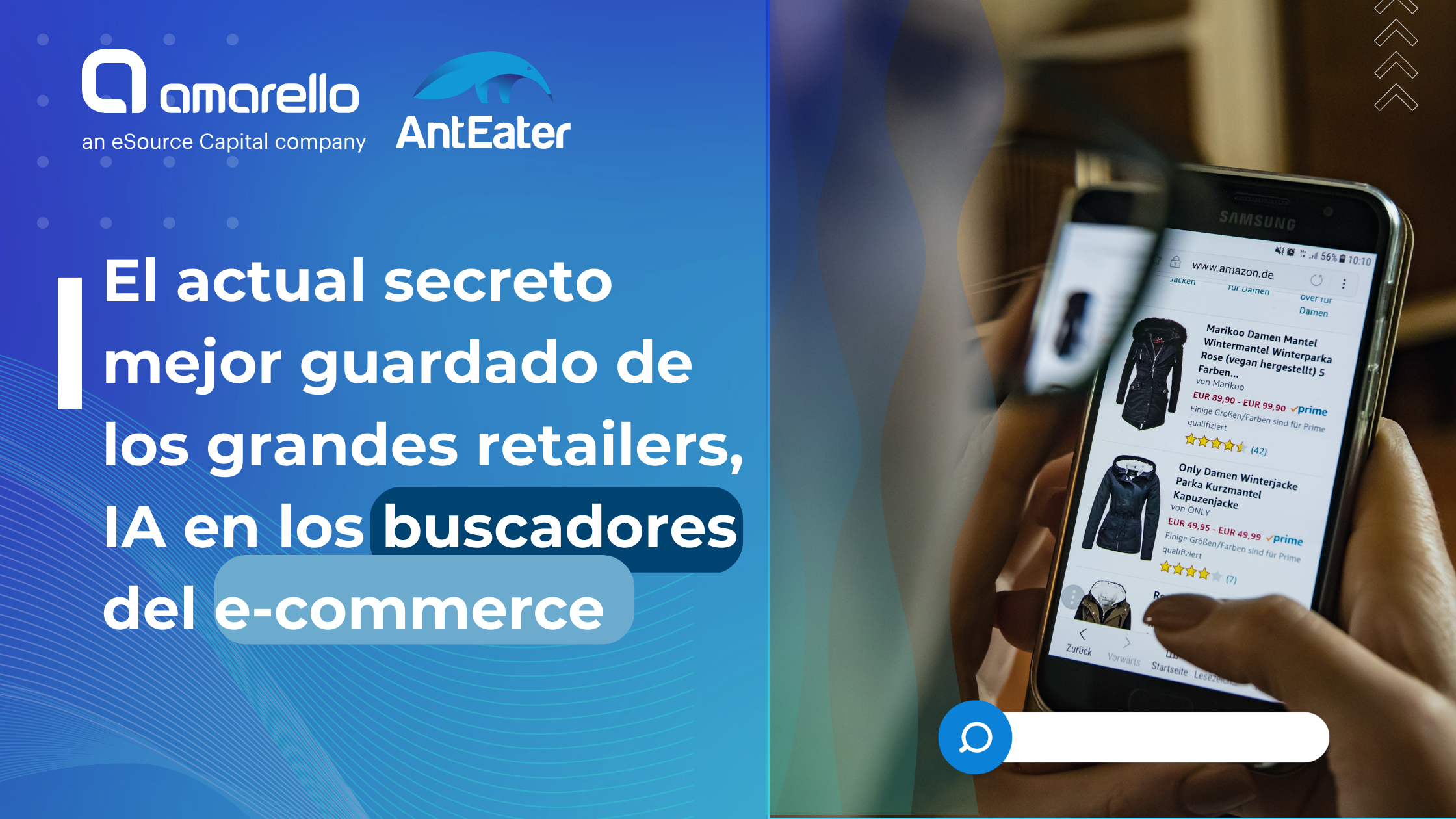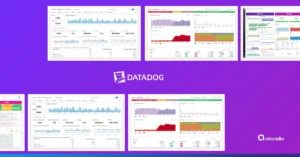Reading time 6 minutes
Thinking about search engines for your e-commerce may not be your top priority at the moment, but it certainly should be and in this short article I explain the reasons why it should be a fundamental part of your retail strategy.
The digital transformation has undoubtedly transformed the way we do and perceive things; prior to the confinement of the pandemic, when thinking about shopping, the collective imagination led us to imagine scenarios with visits to the mall, which could be fun, but also entailed long waiting lines, parking costs, gasoline or cabs, or not finding the desired products and returning frustrated.
You may be interested in: Big Data: The best ally to know what’s happening in your business
All this together with other negative experiences or unnecessary expenses, but that has changed radically, nowadays, when thinking about shopping, it is common to have in mind sites such as: Amazon, Mercado Libre, Lino, or even Facebook marketplace.
A situation that led major brands and established retailers to prioritize their investment in infrastructure to develop or improve their online stores, both in websites and apps developed to improve the shopping experience, but was this a pandemic phenomenon only?
Some may think so, since the preference for e-commerce has increased thanks to health restrictions; but what if I told you that all this can be traced back to the year 2000, hard to believe, isn’t it, but let’s be fairer, let’s go back to the year 2005, .
And what is so important about these years, well, in 2000 Amazon reinvented its business model from books to a global marketplace, a disruptive model, no doubt, but to be fair, it began to exploit the full potential until 2005, when it laid the foundations of the Prime model we know today, and the rest is history?
.png)
Not really, it was just the beginning of a new era, the era of digital commerce. Today we know that having an online store is not enough, competition is voracious and increases every day. More and more offers more and more control to the user, with more and better options, plus equally competitive costs, so how to enter and stay in the competition?
Is AI the answer?
Doubts that probably rob more than one of us of sleep, but is AI the answer, the post-pandemic period, is being dominated by artificial intelligences, which are taking over simple tasks such as conversation, to the complex task of creating “art” although of course this is still under debate.
The truth is that AI has become part of our daily lives, a clear example of this is Chat GPT, which has gone from being an exclusive part of our recreational moments to being integrated into work activities, taking the lead in the current market, at least while Bard from Google arrives at to take on the challenge of being superior in every way.

But back to the point, this is relevant, as AI can fulfill many functions, however, the key may be to go back to the origins, in essence the function of AI has been to find a series of answers to a request by ordering them according to various hierarchical criteria, if any of this sounds familiar is because you are surely one of the thousands of users of the Google search engine, which integrates AI in its algorithm.
It’s not coffee, it’s experience
Starbucks is probably one of the largest coffee shop franchises in the world, and its success has been mainly due to its enormous expertise in customer service. We have heard ad nauseam the claim that they do not sell coffee, but experiences, to the point of turning it into a meme.
But there is some truth in that and although it seems that we have changed the subject abruptly, there is a good reason to bring this coffee shop into the conversation, and that is that it is one of the best examples of how to exploit the traditional fundamental parameters of commerce, the location; to such an extent that this franchise has attributed its success to three key principles: location, location and location, and how does this relate?

Let’s go back to the beginning when I was talking about Amazon and the changes in the collective imaginary when shopping, the great retail giant is the current marketplace leader, despite competing with big players like Mercado Libre or Walmart; but what keeps it at the top, perhaps the answer lies in its A to Z slogan.
This retail giant broke with the myth of location, or rather, I interpret it beyond the traditional convention of a strategic location. It is true that the human being is a creature of habit and it is difficult to make him change his way of doing things, of course, unless it is more practical, easy and efficient.
Read also: Big Data, Retailers’ key to competing with Amazon?
Jeff Bezos understood this and has built most of his fortune exploring the possibilities of this idea, from the one-click buy button to creating a robust ecosystem that aligns perfectly with his brand’s tagline. Its e-commerce platform offers one of the most comprehensive offerings in the market across thousands of products, but more importantly an intuitive way to search for these products and match user preferences.
Did you find everything you were looking for?
A question that you surely associate with supermarket shopping, but what if I told you that this could be the key to compete with the retail giants, it sounds quite unlikely, doesn’t it, however, this question helps us to understand two essential aspects for every business, the experience that our user has had and even more relevant their intention.
.png)
We’ve talked before about the importance of understanding the user’s search intent, but let’s broaden the perspective. If we were to ask people a decade or two ago about the name of a search engine, most reactions would probably be one of confusion, as we were not yet so familiar with these tools; today there is even the verb googlear.
See also: Machine Learning: Future and mainstay of online stores?
When we don’t know or understand something, we just need to open the Google search engine on our favorite device to find the answer, tutorials, or reliable sources of information. Although there are several search engines on the market, the widespread preference for Google’s search engine has a reason, since it is the one that best understands the user’s search intent, thanks to its AI and ML, which learn from each search.
Although of course this works thanks to the wide variety of content available on the web, which allows for very general, or particularly specific results, a key concept to understand for any business; explained in a very simple analogy: Bestseller books are liked by most readers, however there are books that satisfy the needs of more peculiar readers who enjoy genres and/or narratives that would hardly be bestsellers, either because of their complexity or extravagance, however, bookstores that carry those titles have more buyers.
AntEater, from Google to your e-commerce
Google’s search engine’s mission: “To organize the world’s information so that it is universally accessible and useful”.. Letting us see that the central idea of this is none other than to simplify the lives of users and help them find what they are looking for quickly and efficiently, with relevant results.
Read now: How to bring value to my business through Data Analytics?
At Amarello we developed AntEater with the same core idea, but focused on a more particular objective: to help you optimize your e-commerce, in simpler terms we focus on turning a search engine into a sales consultant specialized in your business.
.png)
AntEater is our intelligent search engine solution powered by AI and Machine Learning that takes the very essence of the Google search engine to bring its power to your e-commerce. AntEater is able to understand the user’s intention while browsing your site, which allows you to provide a much more intuitive and comfortable shopping experience, in addition to facilitating cross-selling.
But AntEater’s capabilities not only allow you to improve the user experience by helping them find the products they are interested in, they also collect relevant information for strategic decision making, which will eventually allow you to diversify your offering and prioritize your infrastructure investment based on the user’s search intent.
Think of it this way: most websites, including Amazon itself, compete to appear at the top of the Google search engine, with different strategies, including paid ads, SEO, etc., however, the results are prioritized in order of usefulness to users after understanding their search intent.
.png)
Understanding this in your sales strategy will allow you to know which products deserve a larger stock, which are your areas of opportunity to include new products, those that would be better to remove from your offer to redirect the investment and be more productive, although this is not all.
Remember we talked about the importance of location, and how understanding it beyond the traditional sense, is a key factor for the success of the online retail giant. Well, AntEater, just like the Google search engine is able to understand from which geographies people search your e-commerce, and establish metrics in this regard, information is power, of course, as long as you know how to use it properly.
You can take advantage of this function to optimize your sales strategy in different ways, depending on how you complement it with the rest of the data, from opening physical branches, to creating strategic alliances with distributors, to optimizing logistics costs, using distribution centers and pick-up as retail giants have started to do.
Having all this information will allow you to plan your strategies in detail to reduce the margin of error and above all maximize the return on investment. In short, your search engine is the key to compete with the big players, because it not only improves the user experience, but also nourishes your Big Data with high-value data, allowing your business to be able to anticipate the competition, but how and why does this work?
The importance of an internal, intelligent data search engine
- According to data from Ebolution 84% of users claim to use an e-commerce search engine to help them find the products they are interested in.
- 43% of users immediately go to the search bar.
- Users who use the search engine are 2.4 times more likely to make a purchase.
- SE RankingSE Ranking, which provides similar data, however, also recognizes that 60% of e-retailers offer a poor and unpleasant search experience.
The first is that implementing a search engine increases the conversion rate, the second is that an unintuitive or poorly optimized search engine generates negative experiences, which is particularly important because 68% of users say they would not return to a website if it offers a bad search experience.
See also: The Power of Marketing in the Data Driven Era.
Following this line of information, 30% of digital commerce is limited to maintaining exact matches, which raises the abandonment rate by not recognizing misspellings, changes between singular and plural, not being able to display search options, nor having the ability to find search synonyms.
Why choose AntEater?
When we mention that AntEater takes the essence of the Google search engine for your business, we are not bragging, we are really focused on exploiting the full power of the search engine by putting into practice all our expertise in data, Machine Learning and AI for its development.
{% video_player “embed_player” overrideable=False, type=’hsvideo2′, hide_playlist=True, viral_sharing=False, embed_button=False, autoplay=False, hidden_controls=False, loop=False, muted=False, full_width=False, width=’2240′, height=’1260′, player_id=’106492179589′, style=” %}
Thanks to its AI AntEater is able to solve most of the shortcomings of its competitors by understanding user intent and improving its accuracy thanks to continuous learning courtesy of Machine Learning in such a way that AntEater can deliver:
- A step forward: Autocomplete and/or search suggestions may seem like basic functions, but in addition to helping reduce search times and optimize results, they also improve cross-selling.
- Maybe you meant…: Semantic search is essential, so AntEater’s AI is able to recognize synonyms, distinguish plural and singular, tolerate misspellings and identify similar terms to improve results, creating a sense of understanding with your consumers.
- Bundled is better: Cross selling can not only be encouraged from predictive search, but can also be incorporated by displaying accessories and related products to selected items, reducing shipping costs by buying together and you can even improve this and increase your sales by including exclusive promotions when carrying sets of selected items.
You may be interested in: Big Data, the key for retailers to compete with giants like Amazon?
- Just what you were looking for: Thanks to its AI, AntEater is able to rank results based on user behavior or under key indicators of your e-commerce to prioritize products, creating the perfect match between the results and the purchase intent of your customers.
- Details and price: As Google does, you can show a “preview” of the content before clicking on the result. And asea with descriptive texts, images, etc., in addition to including costs, show the applicable discounts next to the final price when using a coupon or promotion, and not least the product rating.
- Magic recommendations: We already talked about the ability to recommend based on the items you carry, but how many times have we not bought things just because they are on promotion or because everyone else was doing it? Curiosity is a powerful engine when it comes to buying and including banners with promos and discounts or recommending best-selling products is an easy way to increase sales.
- Not available, until…: Sometimes the demand exceeds the supply of our stock, but as customers it is not enough to know that you do not have a product, we like to know when it will be available to know when to come back without wasting our time, AntEater can help you with this and even add the option to reserve the product when it becomes available again.
- Shopping alternatives: There is nothing worse than not finding the product you were looking for and leaving empty-handed. AntEater is in charge of showing relevant results for as many search terms as possible, but if for some reason there are no results, it is able to customize the page with shopping suggestions to prevent your customers from leaving empty-handed.
- Search filters | faceted navigation: Each head is a world and the possibilities are endless, having different ways to display results is essential for your e-commerce to be as intuitive and friendly as possible with as many visitors as possible, since not all of us search in the same way.
.png)
- Types of search: Following the previous idea, text-only searches increasingly seem a thing of the past, with the advent of voice assistants, voice command searches are booming, just as the saying “a picture says more than a thousand words” applies perfectly when searching for new products. Incorporating these search engines takes us one step ahead of the trends.
- Information is power: Journalists have it clear; What, Who, When, When and Where are the questions to solve to make informed decisions, AntEater is able to collect this data to better understand your users and help you optimize your data-driven strategy by better understanding your consumers from statistical data.
.png)
These and more features, such as multiple language support, help us affirm that AntEater is the ideal search engine for your business, having the ability to replace a sales consultant and collect valuable data without being intrusive, which makes it your best option. But why not try it yourself, click here to start your free demo.



